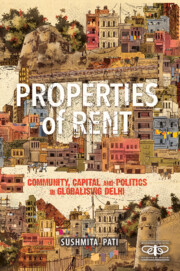Book contents
- Frontmatter
- Contents
- List of Maps and Figures
- Acknowledgements
- List of Permissions
- List of Abbreviations
- Units of Measurement
- Maps
- Introduction
- 1 Creating Values of Land: Law, Records and Kabza
- 2 From Buying Land, Owning Taxis to Becoming Landlords: The Changing Economic Landscape of Villages
- 3 Villages of the City: Ordering Spaces and Aspirations in Neoliberal Times
- 4 In the Shadows of the State: Community as a Mode of Political and Economic Organisation
- 5 Culture, Gender and Belongingness? City and the Violence of Rent
- 6 The Fringes of the Cartel: How the Marginalised Become Landlords
- 7 The Allure of Politics: The Candidates, the Cadre and the Euphoria of Elections
- Epilogue
- Glossary
- Bibliography
- Index
4 - In the Shadows of the State: Community as a Mode of Political and Economic Organisation
Published online by Cambridge University Press: 31 March 2022
- Frontmatter
- Contents
- List of Maps and Figures
- Acknowledgements
- List of Permissions
- List of Abbreviations
- Units of Measurement
- Maps
- Introduction
- 1 Creating Values of Land: Law, Records and Kabza
- 2 From Buying Land, Owning Taxis to Becoming Landlords: The Changing Economic Landscape of Villages
- 3 Villages of the City: Ordering Spaces and Aspirations in Neoliberal Times
- 4 In the Shadows of the State: Community as a Mode of Political and Economic Organisation
- 5 Culture, Gender and Belongingness? City and the Violence of Rent
- 6 The Fringes of the Cartel: How the Marginalised Become Landlords
- 7 The Allure of Politics: The Candidates, the Cadre and the Euphoria of Elections
- Epilogue
- Glossary
- Bibliography
- Index
Summary
Old modes of honour and dignity do not die; instead, they get incorporated into the market, take on price tags, gain a new life as commodities.
— Marshall Berman, All That Is Solid Melts in the AirThe villages, as noted in the previous chapter, rapidly changed into spaces that defied terminologies. They were not slums, nor were they apartment-style neighbourhoods. Instead, they emerged as one of the several forms of spaces that the precariat labour in big cities inhabit. But the 1963 exemption had not just changed the village physically. In the absence of the state following the exemption, the village community banked on its own informal set of institutions to fill the vacuum. In this chapter, I explore two such community institutions—the panchayat and the kunba, which work as economic institutions; and two economic institutions—committees and ‘financing’, which in turn function as social institutions. The bhaichara form of social cohesion, deeply ingrained in the panchayat and kunba relations and even in the ethos of the local financing forms since the 1960s, was further strengthened in the absence of the state. In the shadows of the state and its laws, these institutions flourished and became dynamic entities that could respond to the changing political economy of the city surrounding the villages.
In the next pages, we examine how these institutions were able to interweave their community and economic interests. One functioned like a cartel, another like a joint-stock company and the committees work like localised banks. These new solidarities allowed them to oppose the state during demolitions, consolidate their economic interests, manage the circulation of money and assert themselves as a social group in changing times. As we have seen in the previous chapter, the modern state finds itself co-opted and even interrupted in these spaces where new kinds of sociabilities emerge to sometimes collude with the state and at other times to oppose it. In this chapter, we delve into how a specific kind of accumulation, a vernacular kind, based on the ownership of land, begins to forge itself on the lines of community solidarity.
- Type
- Chapter
- Information
- Properties of RentCommunity, Capital and Politics in Globalising Delhi, pp. 116 - 143Publisher: Cambridge University PressPrint publication year: 2022

